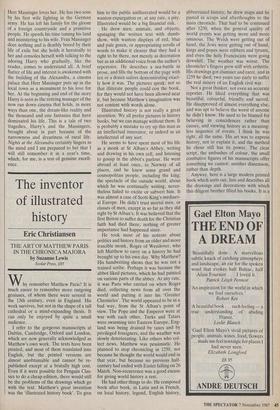A tale of two tragedies
Harriet Waugh
NIGHTS AT THE ALEXANDRA by William Trevor
Hutchinson, f7.95
The Hutchinson Novella series is seen working at its best with William Trevor's Nights at the Alexandra. Trevor is a master of the short story. Too often, when reading them in collected form, there is a tempta- tion to move from one story to another without that pause which allows the mood to linger. Gluttony demands that, liking the taste of one chocolate, you should swiftly chase it with another and yet another until no individual flavour remains and your mouth is sickly with them. The same is often true of reading short stories. Of course, this kind of behaviour is practi- cally forced on a reviewer so it is a particular pleasure to be able to read one such long short story at ease.
Nights at the Alexandra is about an insular 58-year-old bachelor from a south- ern Irish county town who, looking back on his youth, tells of an experience that changed the circumstances of his life and accounts for the man he has become. As a teenage schoolboy during the war, alien- ated, in the way of teenagers, from his parents, siblings and environment, Harry gets involved with a couple who.have come to live out the war in Ireland at the big house of the district. The Massingers are in the uncomfortable position of being a German and English match. Harry, im- pressionable to strangeness and glamour, falls into instant calf-love on meeting Frau Massinger:
She was an extremely thin, tall woman, her jet black hair piled high, her eyes blue, her full lips meticulously painted: I had never seen anyone as beautiful, nor heard a voice that made me so deliciously shiver.
Frau Massinger is English, her much older husband German. Harry fetches and car- ries for them and warms himself at their drawing room fire while Frau Massinger, lying on a sofa, dispenses tea in a red dress while reminiscing about her childhood and how she came to marry Herr Massinger. Herr Massinger loves her. He has two sons by his first wife fighting in the German army. He has left his family for the gloom of a foreign countryside and a primitive people. He spends his time taming his land and ministering to his wife. Frau Massinger does nothing and is deathly bored by their life of exile but she holds it heroically to her and consoles herself with talking to the adoring Harry who gradually, like the reader, comes to understand all. A brief flutter of life and interest is awakened with the building of the Alexandra, a cinema palace that Herr Massinger puts up in the local town as a monument to his love for her. At the beginning and end of the story Harry is seen as the retiring manager of the now run down cinema that holds, in more ways than one, the dream-like reality and the thousand and one fantasies that have dominated his life. This is a tale of two tragedies, Harry's and the Massingers, brought about in part because of the narrowness and dreariness of rural life. Nights at the Alexandra certainly lingers in the mind and I am prepared to bet that I will still remember it in a year's time, which, for me, is a test of genuine excell- ence.



































































 Previous page
Previous page